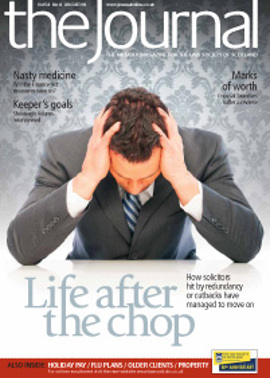A break from illness?

The significant case of HM Revenue & Customs v Stringer [2009] UKHL 31
has finally been decided (following a reference to the ECJ) by the House of Lords. In the midst of the recession this decision could have a significant effect on employers (solicitors’ firms included) in the way in which employees on long term absence are dealt with. The advice which practitioners should give to clients affected by long term absence (whether as employees or employers) may well be coloured by this judgment.
The case, which received much publicity when the European Court of Justice made its ruling on one aspect of it, concerned the relationship between long-term sick leave and statutory annual leave, in terms of the Working Time Regulations (the “WTR”), and specifically what should happen in respect of an employee’s holiday pay when they are on long term sick leave. The House of Lords also clarified which piece of legislation would form the basis for any claim in respect of holiday pay in these circumstances. Although this element of the decision also has a profound effect, it did not generate the same level of media coverage.
Entitlement to annual leave
The Court of Appeal in Commissioners of Inland Revenue v Ainsworth [2005] IRLR 465 concluded that annual leave did not continue to accrue during long term sickness absence, and the worker was not entitled to take and be paid for these holidays even once statutory and contractual sick pay had been exhausted. This overruled two contrary decisions by the EAT in Kigass Aero Components v Brown [2002] ICR 697 and List Design v Douglas [2003] IRLR 14. The Ainsworth decision was appealed, and the House of Lords sought guidance from the ECJ regarding certain aspects of the interpretation of the WTR.
The ECJ delivered its judgment in January 2009 and held that:
Annual leave which is provided for under article 7 of the EU Working Time Directive (allowing four weeks of paid statutory holiday) continues to accrue during sick leave;
- Member states may impose rules to stop the worker taking annual leave during a period of long term sickness. This is acceptable provided that the worker is not denied the right to take the leave at another time, even if this is after the end of the leave year;
- In principle, a worker is entitled to take annual leave during a period of sick leave; however this is left for the national law to determine; and
- On termination of employment, a worker is entitled to payment in lieu for annual leave which they have accrued but not taken due to illness. This payment must be made so as to put them in the same position as they would have been if they had taken the annual leave whilst not on sick leave.
Following the ECJ’s ruling, HM Revenue & Customs opted not to pursue before the House of Lords its arguments on whether annual leave may be taken during sick leave. This was on the basis that the WTR do not allow annual leave to be carried over. Consequently it was considered by HMRC to be clear from the ECJ judgment that the UK would require to allow employees on sick leave to take sick leave during the holiday year of their absence. Unfortunately, given that the House of Lords did not consider this aspect in more depth, there is no clear guidance in relation to whether an employee must notify his employer that he is taking annual leave in order to claim payment under the WTR, or whether the mere fact of being on sick leave for a full holiday year is sufficient to trigger the right to pay in lieu for that holiday year.
Clash of authority
The House of Lords reinstated the orders of the EAT in Stringer, and, in so doing, implicitly approved the decisions in Kigass and List Design. However these cases are contradictory in terms of determining whether the employee requires to give notice of the intention to take holiday entitlement in order to trigger the right to payment in respect of it. If the reasoning in Kigass is followed, an employee does need to give notice under the WTR to claim holiday pay, whereas if List Design prevails it is not a requirement that the employee has actually taken the leave, and therefore the potential liability for employers with employees on long term sick leave that spans a number of holiday years is greater.
Given the ambiguity of the existing authority, it is likely that there will be further litigation in the future in relation to the extent to which workers on sick leave can enjoy their rights to paid statutory holiday if they have been or are off sick, unless the government legislates on the point in the meantime. It is likely that the List Design case will prevail, given that it was decided after Kigass and has subsequently been followed, although until there is clarification from a higher court it is difficult to confirm the extent of employers’ liability, particularly for employees who remain in employment where their rights to bring a claim may conflict with the restrictions regarding payments in lieu of holiday entitlement contained in the WTR.
On a related point, practitioners should note that the ECJ decision is based on the directive, which grants a worker four weeks’ paid leave. This is less than the current UK law (5.6 weeks or 28 days to a normal full time worker).
What is the basis for the claim?
The issue which the House of Lords did address was whether a claim for unpaid holiday pay can be brought under s 23 of the Employment Rights Act 1996 (the “ERA”). The implication of this is that workers will be permitted to make a claim to an employment tribunal within three months of the last in a series of deductions, which may have occurred over a long period of time. The history of this decision began with List Design v Douglas [2003] IRLR 14, when the EAT ruled that such claims could be brought under the ERA. This decision was overturned by the Court of Appeal in Ainsworth, which stated that reg 30 of the WTR was the sole remedy for unpaid holiday pay.
The House of Lords has reversed this ruling, stating that the definition of “wages” covers payments in respect of statutory annual leave entitlement for the purposes of the unlawful deduction of wages.
Therefore, workers are no longer limited to bringing their claim under regulation 30 of the WTR. Had their Lordships held that the WTR was the sole source of remedy, the inherent time limitation within the WTR would have applied. A claim under the WTR specifies that any claim which is brought over three months after the date the payment should have been made is time barred. Accordingly, workers will now be able to bring a claim for unpaid holiday pay spanning a period of several years (subject to the quinquennium in Scotland) under the ERA, provided that the most recent unpaid holiday was within the last three months.
The future
While at first glance this decision may be seen as a technical one, its actual effect may be widespread. Until this decision, employers would often have left employees on long term sick leave on their books, on the basis that they were not costing the employer anything. With this ruling and in particular the ability for an employee to seek sums potentially going back several years, employers may now decide to address the issue of an employee’s absence more robustly.
Faced with questions regarding the implications of this case, practitioners will require to advise clients (be they employees or employers) carefully regarding their options. Employers may wish to implement dismissal proceedings to avoid incurring additional liability, and care should be taken (particularly in respect of allegations that the true reason for dismissal is because the employee asserted a statutory right to payment, not to mention the effect of the Disability Discrimination Act) when advising employers. For those acting for employees, consideration should be given to whether an employee’s position will be detrimentally affected in the long term if an employer is required to give renewed focus to the continuing employment relationship enjoyed by the client.
From a practitioner’s position, proactively advising clients on how they should address this issue, and recommending that appropriate absence procedures are in place to deal fairly and properly with long term absences (with the inherent cost saving that may arise as a result), will be a service which employer clients may well appreciate.
Innes Clark is the head of the Employment Team at Morton Fraser LLP and a chartered member of the Chartered Institute of Personnel & Development. Graeme Dickson is a senior solicitor within the Team.
In this issue
- Planning's big day
- Hair alcohol tests: tackling the root of the problem
- Ask not...
- Trainee recruitment must be more open
- Honest talking
- Out, but not down
- A budget to save the world?
- Uncertain rights
- Copycats: nine lives used up?
- A break from illness?
- On the record
- From the Brussels Office
- Member support: the next level
- Legal practice reinvented
- Beat the pandemic
- Ask Ash
- A vintage problem?
- Final is still final
- Blacklisting blacklists
- A better fitting kilt
- Proper restraint
- Scottish Solicitors' Discipline Tribunal
- Website review
- Book reviews
- Knowledge rules OK?
- Lifting the stones
- Legitimate finding or mortgage fraud?
- Islamic finance: a Scottish lead?
- Environmental Law Centre: taking issues






